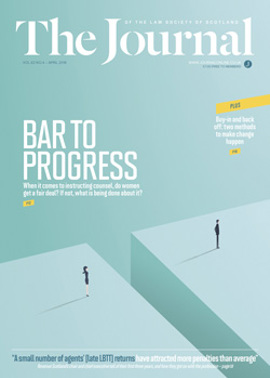Tax and the common touch

Twenty years since the Scotland Act 1998, and in a time of many changes to devolved powers, it can be hard to recall that it is only three years since the first taxes created by the Scottish Parliament began to be collected.
“It is hard to believe that RS has already completed its third operational year,” chairman Dr Keith Nicholson admits. “It was a significant achievement successfully establishing a Scottish tax authority to collect what were, in effect, the first national taxes for over 300 years. Looking back, I am still extremely proud of the dedication, professionalism and hard work of everyone involved in making it possible.”
Chief executive Elaine Lorimer arrived on the scene after year 1, as the organisation was taking stock of experience to date. Within months, RS was restructuring in readiness for its next phase – “for example further developing the skills and expertise of our staff, deepening our expertise of the taxes for which we have responsibility, focusing on improving our processes, strengthening our compliance capacity,” she recalls.
At times there has been a particularly rapid learning curve. The announcement of the LBTT additional dwelling supplement (ADS) from April 2016 gave RS minimal time to prepare for the contentious new charge, but Lorimer cites it as an example of RS’s collaborative approach. “We have developed an excellent reputation for our expertise in leading and managing the implementation of legislative change and doing all that we can to make sure taxpayers, their agents, our systems, processes and guidance are prepared for changes to our taxes.” This applies equally to current developments, including the first-time buyer relief, the LBTT three-year reviews for non-domestic leases, and changes to the ADS.
Policy lines
Underpinning RS’s operations are Scottish economist Adam Smith’s four principles of taxation: certainty, convenience, efficiency and equity (proportionality to ability to pay). Set out in the Charter of Standards and Values adopted under RS’s founding legislation, the Revenue Scotland and Tax Powers Act 2014, these might appear to take in matters for political decision.
Both Lorimer and Nicholson are clear as to where the line should be drawn. “It would not be appropriate for the tax authority responsible for the collection and management of tax to also be setting tax rates and bands, or taking decisions on whether a particular tax policy should or should not be introduced,” Lorimer states. This is in response to the view, put by the Law Society of Scotland among others, that RS should have a more prominent role in the development of tax policy.
She adds: “What is right is that Revenue Scotland has the ability to share its wealth of technical tax expertise, and also its hands-on knowledge of tax operations. We have a responsibility to provide factual, objective, operational information to enable officials and ministers to make informed decisions about particular tax proposals and how they might operate in practice.”
For Nicholson, “certainty” is about the taxpayer knowing how much they have to pay, which RS assists through detailed online guidance for taxpayers and agents, and regular forums on the taxes it collects (LBTT and Scottish landfill tax; Scottish income tax rates remain an HMRC responsibility), along with technical bulletins, roadshows and YouTube videos. “Convenience” ensures that systems and processes are open and accessible, exemplified by SETS (the Scottish Electronic Tax System), which against an original target of 90% of tax returns submitted online has achieved more than 98% from the outset. And on efficiency, “Although the scale of the taxes collected by RS is different, we can benchmark our costs against other similar tax authorities. At 0.7% of the total tax collected, we place well against other countries.”
Nonetheless, RS does have further involvement behind the scenes. It provides information to help officials and ministers decide on particular tax proposals and how they might operate in practice; it seconds staff to Scottish Government teams working on legislation; and Lorimer was invited to join the group established to review Holyrood’s budget process.
Equally, RS engages in a range of stakeholder activity in respect of its own functions. Aside from a close working relationship with HMRC, it joins Police Scotland, SEPA and the Crown Office & Procurator Fiscal Service in a multi-agency Governance Group considering cases involving tax avoidance or evasion to ensure the most appropriate sanctions – civil or criminal – are applied.
User involvement is also key in developing guidance, as well as implementing legislation, and RS acknowledges the role of the Society, whose members it meets regularly in local and national forums.
“We know from our engagement with the Society that our legislative guidance is crucial,” Lorimer acknowledges, “and everyone involved in LBTT has benefited from input, in the form of suggestions for case studies and FAQs, for example, from solicitors. The technical bulletin we published recently was in direct response to calls for clarification on some technical points by Society members.”
Nicholson further points out that working relationships are not confined to operational level: in December RS board members met the Society’s LBTT Subcommittee for a more strategic focus on upcoming priorities and areas of interest for solicitors. “While we may not always agree on matters,” he continues, “the professionalism, specialist knowledge and experience that the subcommittee brings to the table is honest, practical and pragmatic. As a result, this form of engagement is hugely helpful to RS staff and to the board.”
Leases: the new reviews
For RS, this has been further demonstrated in the raising of awareness around the three-year reviews for leases, the first of which fall due this month – the article at Journal, February 2018, 34 hit the mark.
Lorimer observes: “We have a responsibility to ensure that the process to submit the LBTT return for the lease review is accessible and straightforward for taxpayers and agents alike. Again, the Society has helped us to find agents willing to participate in our user-testing sessions so that the changes to the tax system are fit for purpose.”
She applauds the online articles posted by many law firms, and encourages others to use their own communication channels to raise awareness. “We have a great deal of information on the RS website, so highlighting that in any way would be greatly appreciated.”
Next steps
There are, of course, times when RS has to flex its enforcement powers – but is it always due to wilful default? Analysis of late returns has revealed a small number of agents whose returns have attracted more penalties than average, and RS is keen to understand why these failures occur and any steps that might be taken to minimise them – another pending collaboration with the Society.
What further changes can solicitors expect to see in the near future? One important RS project is replacing the SETS online return and collection system: the contract with the supplier ends next year. While user satisfaction with the present system appears high, Lorimer explains that introducing a new system (due April 2019) “has the potential to help us improve some of the technical and operational areas of our work, so we have set up a programme to re-evaluate, redesign and optimise our service delivery as a whole” – hopefully for a further 10 years.
She adds: “As always, RS will work collaboratively with Society members and others so that systems and processes are fit for purpose. The programme has been designed specifically to be user-led and we are working with our stakeholders to understand the improvements they would like to see to the system. Anyone wishing to get involved can contact the programme team at servicedesign@revenue.scot”.
And what of GDPR? Nicholson, who himself has an IT background, recognises the new data protection regime as “a critical area of focus for the organisation”. He affirms: “We are comprehensively reviewing our processes and procedures; however, as a tax authority, we already have robust and well-established procedures in place to protect the information we hold with the required consents in place.”
In this issue
- Fair instructions?
- The peasants have no bread
- Bad weather – adverse consequences?
- Defending children’s human rights in Scots law
- Scottish income tax – where are we now?
- Appreciation: Professor Emeritus Alexander John ("Alastair") McDonald
- Reading for pleasure
- Opinion: Gordon Addison
- Book reviews
- Profile: Paul Mosson
- President's column
- RoS welcomes new Keeper
- People on the move
- Fair instructions? (1)
- Law: not just a profession, but also a business
- Buying in and backing off
- Tax and the common touch
- Needs of the user
- Where did the money go?
- Five FOI tips every lawyer should know
- AI – the legal and ethical minefield
- Too long, too long?
- Times still a-changin' in '18
- An infrastructure levy for Scotland
- Tax changes to termination payments
- GDPR and the cloud
- Tide runs for lenders
- Passing on a pension to the right person
- Know your FTAs
- Scots to co-host ICW in Toronto
- Office of the Public Guardian: EPOAR and more
- Public policy highlights
- Our survey said...
- Q & A corner
- A profit without honour
- Appreciation: Professor Emeritus Alexander John ("Alastair") McDonald WS
- Ask Ash
- ASPIC finds its feet
- Pushing for change






